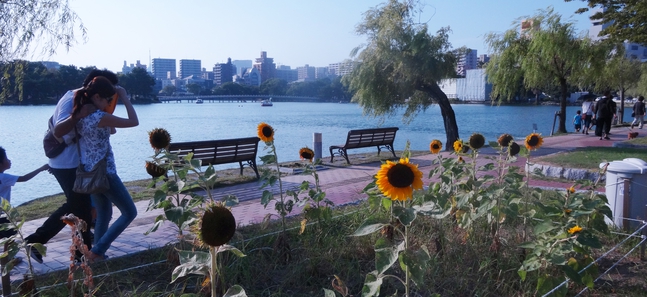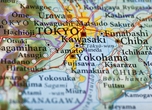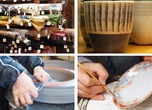10 things to do in Fukuoka
A relaxed getaway for harried Tokyoites

Posted: Tue Apr 08 2014
If Tokyo is the friend who rushes you between sights and social engagements to a turbo timetable, Fukuoka is the relaxed southern cousin who sits you in a sunny spot, pours you a beer and tops it up as you chat. Kyushu’s largest city is often overlooked on tourist itineraries, yet is beloved by its residents, who clearly know how to unwind – it has the second highest number of bars, cabarets and clubs in Japan after Tokyo. Whilst crowds gather for big festivals like the Hakata Dontaku parade in May and to see towering floats raced at dawn at the Gion Yamakasa in July, Fukuoka remains down to party all year round.
1. Run on water in Ohori Park
Take your packed lunch to Ohori Park and settle down on a bench with a peaceful view of the lake (pictured above). The park was once part of the moat for the adjacent Fukuoka Castle, which may have made this list if it were still standing – some ruins are still visible in the neighbouring Maizuru Park. Take a walk (or jog) around the pond, then hit the water in a swan-shaped boat or even run on water by renting a ‘water strider’.
Ohori Park: Ohorikoen or Ropponmatsu Stations. 092-741-2004.
2. Slurp a streetside ramen

Fukuoka is renowned for its ramen, especially the famous tonkotsu variety. Rock up at a Yatai – one of the open-air street stalls which set up shop every evening on the riverside and around the centre of town – to try this silky white broth from Hakata. If you just can’t get enough noodles, Ramen Stadium in Canal City shopping centre houses eight different ramen restaurants.
Yatai stalls along Naka river north bank: 1-8-25 Nakasu, Hakata-ku.
Ramen Stadium: Canal City Hakata, 5F Cinema Bldg., 1-2 Sumiyoshi, Hakata-ku. 092-282-2525. canalcity.co.jp.
3. Dress up in Daimyo

The Daimyo district to the west of Tenjin Station is home to some of Fukuoka’s best bars, cafés and restaurants. To fit in with the hipsters, pick an outfit from one of the many vintage shops in the area. These range from Union 3, a clothing exchange full of designer finds with an extensive menswear section, to smaller boutiques with items picked or made by hand, such as Eureka (pictured above).
Union 3: 1F Basic Daimyo, 1-2-20 Daimyo, Chuo-ku. 092-737-8997. union3.jp.
Eureka: 1-14-18 Daimyo, Chuo-ku. 092-716-1564. eurekashop.exblog.jp.
4. Have one too many at Haki

Oyafuko Dori, meaning ‘street of naughty children’, is one of Fukuoka’s main destinations for after-hours clubs and international bars. Karaoke joints and kebab outlets nestle among all-you-can-drink deals and signs promising that English is spoken. As you wobble home, you may find you need to stop off at 'Haki Bar', a streetside sink for those who need to evacuate that last shot. Don’t say we didn’t warn you...
Haki Bar: 1-1-30 Maizuru, Chuo-ku.
5. Tap your feet to the Tenjin beat

For a (slightly) more sophisticated evening, head to a live music venue in the centre of town. Fukuoka regulars and visiting musicians play together at jazz jam sessions at clubs such as New Combo, whilst Brick Sound Bar in Daimyo caters to a young crowd of varied tastes, with acoustic guitar sessions, varied DJ nights and party sounds from around the world.
New Combo: 5-1-22 Watanabedori, Chuo-ku. 092-712-7809. www.f2.dion.ne.jp/~combo/.
Brick Sound Bar: 5F Asheville, 2-1-14 Daimyo, Chuo-ku. 092-406-9070. brick-fukuoka.jp.
6. Pray for good exam results

Students with tests looming can ask for favour at Dazaifu Tenmangu shrine, dedicated to the god of literature and calligraphy. For those less desperate to pass, there are also a range of smaller shrines, temples and zen gardens nearby, as well as Kyushu National Museum. In March, when the plum blossoms are in full bloom, writers sit by the water to compose waka poetry and drink sake in the centuries-old Kyokusui-no-en festival (pictured above). Dazaifu is 30 minutes by Nishitetsu train from Tenjin Station.
Dazaifu Tenmangu Shrine: 4-7-1 Saifu, Dazaifu. 092-922-8225. dazaifutenmangu.or.jp.
Kyushu National Museum: 4-7-2 Ishizaka, Dazaifu. 050-5542-8600. kyuhaku.com.
7. Grab a local lunch at the market

Yanagibashi market, or ‘Hakata’s kitchen’, is a charming covered arcade decorated with coloured flags, filled with seasonal produce. Marvel at a range of fresh and sometimes surprising vegetables, tea, fish, meat and sweets. Try a Yanagibashi burger, made from fried fish cake, and find out how dashi flakes, which go into soba and udon noodle broths, are made.
Yanagibashi Market: 1-5-1, Haruyoshi, Chuo-ku. 092-761-5717.
8. Party all night on the beach

Fukuoka's own man-made beach, in front of Fukuoka Tower in the Momochi district, is a pleasant stretch frequented by sunset seekers, dog walkers and volleyball teams. Some beautiful natural sands can be found a little out of town - ride the ferry from Meinohama Port to Nokonoshima Island for a beach view of the city skyline, or explore the coast of the Itoshima Peninsular (30 minutes by car or by bus from Chikuzenmaebaru Station). One of the best shores in Itoshima is Keya Beach, which attracts the city's hedonists with its hippy vibe and yearly Sunset Live Festival in September.
Nokonoshima Island is accessible by ferry from Meinohama ferry port: 3-1-1, Atagohama, Nishi-ku. 092-881-8709.
Sunset Live Festival, 5-7 Sep 2014: Keya beach, Itoshima. sunsetlive-info.com.
9. Immerse yourself in Asian art

Fukuoka Asian Art Museum is the only gallery in the world dedicated exclusively to modern and contemporary art from Asian countries. With no works that imitate traditional or Western art, visitors can reflect on life in Asia today and the changes that it has experienced in recent history. Temporary collections focusing on popular culture are often busy – recent exhibitions include 'Studio Ghibli Layout Designs' and 'Doraemon’s Scientific Future'.
Fukuoka Asian Art Museum: 7th & 8th Floors, Riverain Center Bldg., 3-1 Shimokawabata-machi, Hakata-ku. 092-263-1100. faam.city.fukuoka.lg.jp.
10. Meet the cats of Ainoshima Island

Fukuoka may be home to at least two cat cafés - and one owl café - but sleepy Ainoshima Island off Hakata Bay is now world famous because of the number of stray cats living there. Photographer Fubirai’s cute cat pics (pictured above) from the island have gone viral online and you can meet the kitties by taking a ferry to the island. The port is slightly out of the way in Shingu, so this may be an adventure for hardcore cat fans only.
Ainoshima Island: Take a ferry from Shingu Port, 811-0116 Fukuoka-ken, Kasuya-gun, Shingū-machi, Minato. Timetable here. 092-962-0238.
How to get there
Fukuoka's Hakata Station can be reached from Tokyo by Shinkansen in around five hours on the fastest train for ¥22,950 (non-reserved seat). Alternatively, there are over 70 flights a day from Tokyo to Fukuoka, making it one of the top ten busiest air traffic routes in the world. Flight time is just under two hours and prices vary. Budget airlines such as Jetstar offer flights from Narita to Fukuoka from ¥6,190 one way. A road trip from Tokyo to Fukuoka takes around 13 hours – not including toilet stops.
Where to stay
There are plenty of places to stay in Fukuoka, for all budgets. Choose between hostels such as Guest House Kaine (www.kaine-g.com, dormitory ¥2,500 per person, private rooms ¥6,000 per person) or something swankier such as With the Style hotel (www.withthestyle.com/en, from ¥45,140 per room).
Tags:
Tweets
- About Us |
- Work for Time Out |
- Send us info |
- Advertising |
- Mobile edition |
- Terms & Conditions |
- Privacy policy |
- Contact Us
Copyright © 2014 Time Out Tokyo














Add your comment